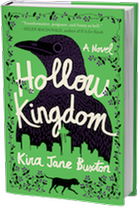
Kira Jane Buxton's debut, Hollow Kingdom, offers a unique, oddly hopeful perspective on the end of human civilization, thanks to the novel's protagonist, S.T., a domesticated crow. In Buxton's vision of the apocalypse, an unidentified contagion transforms the human population of Seattle, and possibly the entire world, into shambling, zombie-like creatures. For S.T., the apocalypse begins with his owner, Big Jim, losing an eyeball, which S.T. thoughtfully caches "in the cookie jar in case he could use it later." Hollow Kingdom combines dark subject matter with an oddball sense of humor in what proves to be a winning formula.
S.T. is slow to accept Big Jim's decline and, by extension, humanity's decline. His close relationship with Big Jim has left him with a profane vocabulary--he calls all humans "MoFos"--a bank of lowbrow pop cultural references and an enduring admiration for humanity and its creations. When S.T. is forced to leave Big Jim's home, he encounters a Seattle being reclaimed by the natural world, with few animals sharing his nostalgia for humanity's destructive reign. S.T. informs us that most fauna have long called humans Hollows, "named for their dissociative state. In the natural world, MoFos are mistaken for milky-eyed machines intent on destruction, empty vessels that have lost their inner intelligence--the walking blind, dumb animals." In other words, other creatures think human beings resembled zombies long before the contagion hit. In Hollow Kingdom's version of the apocalypse, nature carries on just as well--better, even--without us, and the apocalypse seems less like an ending than the beginning of a new stage of life on Earth.
Hollow Kingdom has some of the trappings of an epic fantasy, with world building that establishes different factions of animals, including the college crows--the largest murder of Seattleite crows, so named because they roost on the University of Washington's Bothell campus. S.T. is always at the ready with an opinionated aside: "They are also a giant troupe of swamp donkeys. UW Bothell is essentially an enormous frat house for a bunch of elitist toot cabbages." As in a fantasy novel, S.T. is forced out of his provincial home into a wider, more dangerous world on a series of quests. He is accompanied by his faithful steed Dennis, a quiet, slightly dopey bloodhound that lets S.T. perch on his back while they wander the streets of Seattle. S.T. holds on to hope that a few uninfected MoFos are out there, but is invested with a new mission: to save the "domestics." He must figure out a way to break windows and open doors before Seattle's legions of pets die, trapped in their homes.
In its broadest strokes, Hollow Kingdom is an environmentalist parable. In the novel, humans receive their long-delayed comeuppance for their mistreatment and ignorance of the natural world. It's no accident that the shambling hordes are obsessed with screens and phones--there are not-subtle warnings about technology throughout the story. Buxton is at her best, however, in imagining the inner lives of animals. The book is an exercise in empathy, an attempt to extend love and understanding to every form of life on earth. Occasional chapters break from S.T.'s point of view to take the perspective of animals around the world. These chapters are some of the most beautiful, offering clever interpretations of each creature's unique way of thinking. An urban elephant herd in Thailand has a chapter that reads like a poem: "walk with us/our numbers grow and we gather/family woven together like nest of a cave swiftlet," while Genghis Cat thinks like a prototypical feline: "I am still utterly amazing... I followed him like the magnificent ninja I am, always out of sight, which is a shame because I am very, very good-looking."
Hollow Kingdom has major thematic messages, but it's also the story of a domestic crow who has to learn to trust others: "Trust, it turned out, was a very beautiful and fragile thing with a taste like wild raspberries and experienced only by the very brave." S.T.'s love for Big Jim is such that he overlooks his many flaws, and seems to have absorbed a measure of Big Jim's cynical, every-man-for-himself attitude. S.T. has to learn that every crow needs its murder, as he bands together with other animals to save the domestics and to combat new threats. He also has to temper his self-identification with and admiration for MoFos, and learn to appreciate everything that comes with being a crow.
If this all sounds very weighty, it's important to emphasize that Hollow Kingdom is an extremely funny, occasionally silly book. The reader will need to possess an appreciation--or, at least, a tolerance--for copious animal puns and characters like Winnie the Poodle, who "was raised to talk about herself in the third poodle." S.T.'s witty commentary is a highlight of the book, though so frequently profane that it resists quotation. What makes Hollow Kingdom special is the ease with which Buxton offsets heavy themes with humor. At the heart of the novel is an entertaining adventure story, like Lord of the Rings crossed with The Incredible Journey. S.T.'s relationship with Dennis achieves pathos and an incredibly earned emotional denouement that I would have never predicted at the start of the novel. Hollow Kingdom is a surprising, funny, genre-bending novel, an environmentalist parable crossed with an epic adventure story, difficult to describe and even more difficult to put down. --Hank Stephenson

